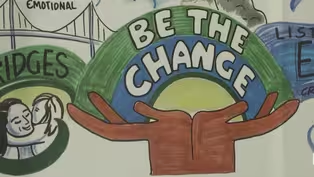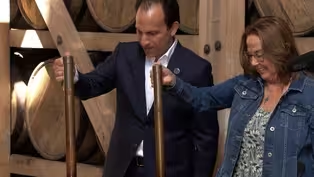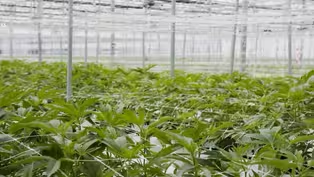
"Pantsuit Politics" Podcasters Discuss Toxic Social Media
Clip: Season 4 Episode 58 | 10m 58sVideo has Closed Captions
Podcasters talk about what can be done to improve social media's toxic atmosphere.
The hosts of the podcast "Pantsuit Politics" talk about having "grace-filled" political conversations and the impact of social media.
Problems playing video? | Closed Captioning Feedback
Problems playing video? | Closed Captioning Feedback
Kentucky Edition is a local public television program presented by KET

"Pantsuit Politics" Podcasters Discuss Toxic Social Media
Clip: Season 4 Episode 58 | 10m 58sVideo has Closed Captions
The hosts of the podcast "Pantsuit Politics" talk about having "grace-filled" political conversations and the impact of social media.
Problems playing video? | Closed Captioning Feedback
How to Watch Kentucky Edition
Kentucky Edition is available to stream on pbs.org and the free PBS App, available on iPhone, Apple TV, Android TV, Android smartphones, Amazon Fire TV, Amazon Fire Tablet, Roku, Samsung Smart TV, and Vizio.
Providing Support for PBS.org
Learn Moreabout PBS online sponsorshipAccording to a newly released survey, roughly two out of three Americans believe that coarse political rhetoric is stoking violence in America.
That's according to a Reuters Ipsos poll conducted in the days following the killing of conservative political activist Charlie Kirk.
Kirk, whose political organization Turning Point USA helped mobilize young voters to support Trump in the 2024 presidential election, was speaking at a college campus in Utah when he was gunned down before an outdoor audience.
While Kirk is credited with elevating civic dialog, especially among young people.
He was also criticized for his controversial comments about minority groups.
Yesterday I talked with two podcasters in Kentucky, Sarah Steward Harlan and Beth Silvers, who've written about having, quote, grace filled political conversations and the impact of social media.
Sarah, I want to come to you first, if I may, and just ask you about how you would rate the America's political discourse right now, particularly given the the incidents of the last few days with the shooting death of Charlie Kirk.
Where do you see our conversations heading?
And so many people feel like it's at a point of no return when it comes to civility.
Well, I'm going to do something I don't think I usually do, which is I'm going to distinguish between online discourse and in-person discourse.
So I've had really good conversations in person with some people in my life who are both confused about the very online discourse since the death of Charlie Kirk.
And so people who have strong opinions about, the, the fallout from that horrific act.
And while I have had strained conversations in my real life, they got somewhere.
So I would rate the in life in real life conversation as a solid.
I don't know, 6 or 7.
The online discourse.
Can we go below zero.
I think it is pained.
It is incendiary.
It is stilted and opaque and so many ways.
That I think has really, really contributed to the conflict and not move the conversation forward.
So I guess before I would rate anything, I'd say, what, where where is the discourse?
Where is the discourse where we're talking about?
Yeah.
Well, and I think you've hit on both of those things, right.
In real life IRL versus social media.
And, Beth, I want to pivot and ask you the same question.
Where do you see it now?
And are we at a point of no return?
I don't think we're trying to do discourse on social media.
So I try to remember that, that this isn't the same thing as having a conversation in person.
I was talking about how in-person you can get somewhere on social media.
You don't.
And I think that's because we aren't showing up to really engage with other people as whole people.
We're sort of responding out of stress.
Social media is a place to put something that is rising up inside you, and maybe you don't feel like you have another place to put it.
And it really flattens us out to each other.
So I hope that something that can come from this very tense and strained moment is a reexamination of what we're even trying to do when we pop on to Facebook or elsewhere.
You know, I have been trying over the past couple of days to post more than I ever have, which is sort of the opposite reaction of what I thought I would have.
But I keep thinking, you know what this assassination has shown me is that people are here and my people are here.
My community, people from Kentucky, from where I live, people I will see at school events and at the grocery store and at church are here on Facebook.
And it is meaningful to them to say things, to pronounce things on Facebook.
And so maybe the good that I can do in this moment is to just be there to and to try to have some kind of online presence that hopefully feels a little bit more grounding and connective, and that just tries to remind people like, maybe you're denouncing all folks like me, but here I am still and I'm reading it.
And, and you can look at this beautiful picture of my yard or something, and maybe we can just try to remember each other a little bit better.
I don't think it's too far gone, but I feel like we are very sick.
Right now.
So I'm just trying to look for the medicine.
Yeah, that's a good way of putting it back.
Look for the medicine.
Right.
As Mister Rogers would say.
Look for the helpers.
And we've talked a little bit about, cowboy keyboard cowboys, right, where people can just almost exercise their own form of vigilante justice through strokes of the keys.
Right.
And some have even said maybe we need a social media timeout, that people need to chill out, calm down, not stroke the keyboards and just let things simmer and be more, introspective and contemplative about where we are before we engage in these social media platforms.
Sarah, do you think that's a good idea or nay?
Oh, I would love that for all of us.
I mean, here's the thing.
You know, I recently I did not post, on social media at all the days, including Charlie Kirk's death.
In the days after I would get on there, I would start to type something.
I'd be like, now, I don't want to do this.
And today I shared something really about social media, asking exactly what Beth said.
What do we what are we doing here?
And I would love it because I think there's a lot of people interested in that question and conversation.
But at the end of the day, these platforms are defined by an algorithm, and the algorithm is not showing my moderate curious post to anybody because that's not what gets clicks.
That's not what gets comments.
That's not what gets the engagement.
Instead, the algorithm is showing to me people in my community who have been fired for posts they've said or people in my community who are cleaning out their friend group, and it's like, see, see, conflict, conflict, conflict.
And so every time I go on there, I'm like, I just, I don't know, I want to put good things in the river.
I want to be a person that contributes.
But the the structure of the platforms themselves seem to really reward and, sort of raise up only one type of engagement, which is something I really don't want to participate in.
That's what I think is so problematic.
And it's and if you want to talk about this, which I think so many people do, I don't think it is a bad instruction to say like, man, step away, take a time out or take a beat.
But I know as someone who's been almost a lifelong journalist, I think about the news, agnostics and atheists who have driven away from news platforms because they felt like they couldn't.
They couldn't either see themselves, or it was all such doom and gloom that there were never any solutions, and that they felt helpless and decent and disengaged from watching news because they felt, what's the point?
Right.
So are we there yet?
When it comes to social media?
I don't think so.
I mean, as much as I would love to have that time out and to say we are there yet.
People have to have a place to go with these feelings.
And I think until we build up more robust places within our communities to take those feelings in person, we're going to see this.
You know, people say that they are agnostic or atheist about the news.
But then you see, when events like this happen, that they are just repressing it.
They're just saving it all up.
Sarah talks about when she ran for local office.
She would knock on someone's door and they would be like, relieved to have someone in front of them that they could share all their opinions with.
So I think that the question in my mind is like, what can our civic structures, what can our churches do?
What can book clubs do?
What can libraries do to give people a healthier place to actually come work these things out?
What can we do when our families we say that we don't like to talk politics, and so we go to the maximal conflict on the internet.
You know, where can we do soft to medium conflict in person to try to get better at this?
Yeah.
Sarah.
That being said, I think the presidential candidate who says my one of my policies is going to be requiring social media platforms to go back to the timeline.
That's just the newest thing at the top.
Might sweep the Electoral College.
I don't know, I think that would be a really popular sort of policy to say, like, I'm just not going to let them platform conflict.
They have to just post whatever's newest.
If you want to dig down like we have, we used to have to in the good old days of Facebook.
Go for it, you know.
So I think that there I have noticed a shift, not just in myself, but in the people around me about how they feel about social media in particular.
You have state after state after state banning phones in schools.
Have Spencer Cox it's Cox introducing this or this legislation to or passing this legislation in Utah to put age limits on social media.
So I think that there is a big like shift.
I know I can feel so helpless and like nothing changes, but things do change in the conversation.
People start to see things play out in their own life and want changes in their life as well.
Not just, you know, incendiary post on Facebook.
They want to see things improve.
They want to see things get better.
And I think there has been an enormous sort of groundswell of frustration with the way social media has polluted our political discourse and turned us into enemies.
But I see just continuing to grow and grow and grow.
Well, for our audience, you may have missed our interview together, some years back, the book that you all wrote together, I think you're wrong and parentheses, but I'm listening.
And the subtext is a guide to grace filled political conversations.
This is just as relevant now as it was when you all penned it.
And, perhaps this can all help us as the holidays approach, have some very civil, peaceful holiday gatherings as we know that these conversations, will still be simmering in some form.
Sarah and Beth, thank you so very much for your time today.
And we really enjoyed talking with you about this.
Thank you so much.
Insect Populations Decline Without Direct Human Interference
Video has Closed Captions
Clip: S4 Ep58 | 3m 16s | New study shows insect populations declining even when people aren't around to bug them. (3m 16s)
Video has Closed Captions
Clip: S4 Ep58 | 3m 34s | Annual conference shares resources on preventing child abuse. (3m 34s)
Stivers Says Lawmakers Noting Bourbon Industry’s Challenges
Video has Closed Captions
Clip: S4 Ep58 | 2m 32s | Senate President says lawmakers will try to create best environment for bourbon industry. (2m 32s)
UK Could Open Indoor Cannabis-growing Facility
Video has Closed Captions
Clip: S4 Ep58 | 3m 40s | Director of UK Cannabis Center updates lawmakers on future plans for center. (3m 40s)
Providing Support for PBS.org
Learn Moreabout PBS online sponsorship
- News and Public Affairs

Top journalists deliver compelling original analysis of the hour's headlines.

- News and Public Affairs

FRONTLINE is investigative journalism that questions, explains and changes our world.












Support for PBS provided by:
Kentucky Edition is a local public television program presented by KET



